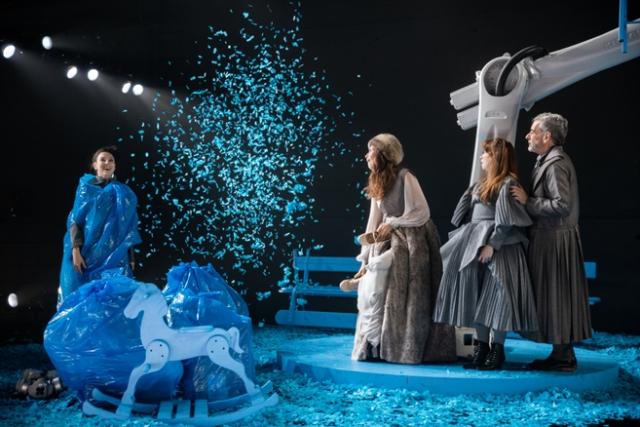
I seem to remember reading, in all of the hoopla surrounding the Baryshnikov Art Center’s Production of Chekhov’s The Cherry Orchard, somebody saying “Unlike anything that you ever saw before.” This talking head could also have said, as audiences were soon to find out, that this production, adapted, created, reimagined, and directed by Kiev born Igor Golyak, and starring Mikhail Baryshnikov, is a work of genius. Obviously, the great Chekhov is embedded deeply in their bones.
Titled ”The Orchard,” Golyak’s two-version production (both live and virtual), presented as a limited run, opened on June 16 and closed on July 3, 2022. Way too soon if you ask me. Hopefully, it will be brought back somehow, somewhere by a theater-loving angel.
To ensure that the audience’s eyes and ears were glued to the stage throughout, director Golyak cleverly chose to use what some critics deemed the star of the play, an imposing, vertical, 12-foot metal crane-like arm placed center stage on an all-blue set (Anna Fedora). It serves coffee, sweeps the floor, acts as a tree, a person, a bookcase, a place to hide from danger, and a beeping camera that films the play’s goings on. More importantly, it serves to direct our eyes to the play’s imminent action.
Brilliantly encasing the entire production is Carol Rocamora’s translation of Chekov’s last play, The Cherry Orchard (1904). Though most of the original language was kept, a few scenes, though barely noticeable, were cut and rearranged. Eliminated was Dunyasha. the maid, and her would-be lover.
Added to the play’s mix, quite effectively, was a giant stage-covering scrim which intermittently featured on its surface live text, video, and close ups of the actors in real time. Equally absorbing were several speeches delivered in ALS sign language, as well as in French, Russian, and German. Also, slipped into the play’s text, adding a twenty-first-century touch, was mention of the Ukrainian cities of Mariupol and Kharkiv.
Another beguiling addition to the stage was a robotic silver metal dog that could be seen playfully scampering about the stage. Able to do tricks, as well as play dead, it was an audience favorite.
Aside from Firs (Baryshnikov), the long-time estate’s keeper appearing to open up the house, the play truly begins with the arrival of Lyobov Andreevna Ranevskaya (Jessica Hecht) to the family’s estate in the Russian countryside. Ranevskaya had run off to Paris with her lover to escape the grief she felt over the loss of her young son. And now she is back.
Following in her fashionable entrance, we meet her brother Gaev (Mark Nelson), her adopted daughter Varya (Elise Kibble), her natural daughter Anya (Juliet Brett), and their servants. They are there to try and save the beloved home and cherry orchard from being auctioned off due to an unpaid mortgage.
Rounding out the cast, each with their own intricate story which links them closely to the family, is Darya (Charlotta Ivanova, also Golyak’s wife), Pyotr (John McGinty, hearing-challenged in real life), a frightening Russian-speaking Passerby (Llia Volak) in black military dress (another nod to the ongoing Ukrainian war), and Lopakhin (Nael Nacer), the now-rich former peasant who ends up buying the Orchard.
Lopakhin’s idea to save the orchard, which unfortunately falls on deaf ears, is to turn the estate into a tourist attraction by creating rent-paying summer houses on the property. We realize that times are a-changing – the Russian revolution of 1917 which marked the end of the Romanov dynasty is only 11 years away – when Lopakhin gloats, after he buys the estate that he and his father were never allowed into the family’s home. His only regret is that the beautiful Ranevskaya does not come along with his purchase of the estate.
The virtual live production, with the same 2 hour running time, features the play’s most dramatic scenes, punctuated by performances by Baryshnikov as Anton Chekov, and Hecht as his wife and mistress. Here the viewer follows Chekov into a virtual replica of the Baryshnikov Arts Center building where we could enter various rooms and hear both Chekhov speaking in Russian with subtitles, and his wife and mistress, often quoting letters, talking about their lives.
Happening at the same time we get to see the audience in the theater, some who are participating in the estate’s sale, flashed on the scrim. The virtual performance ends outside the arts center with Baryshnikov, this time as Firs, slowly walking away with his belongings. In the live theater production, after everybody leaves, and Firs forgotten by the family he has served all his life is alone, he sadly comments to himself that, “Life has slipped by as though I hadn’t lived.”
For those lucky enough to catch either version of the play, both were magnified by an army of design wizards and technical geniuses, from Scenic Design (Anna Fedorova), Costume Design (Oana Botez), Lighting Design (Yuki Nakase Link), Projection Design (Alex Basco Koch), Sound Design (Tei Blow), Robotic Design (Tom Sepe), Emerging Technology design (Adam Paikowsky). Interactivity Design (Anna Hrustaleva), to an ASL sign language expert (Alexey Prosvirnin), and a clowning coach (Alita West). The experience, hypnotic to say the least, was not unlike watching a giant aquarium filled with a frenzy of tropical fish. This, primarily due to the effect of the giant scrim which ironically both distanced us and brought us a lot closer to the play’s action.
